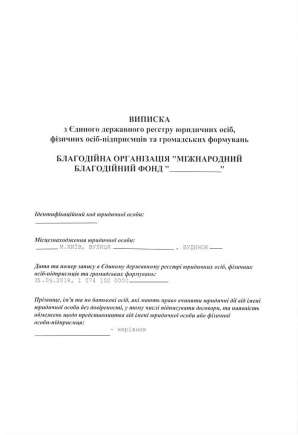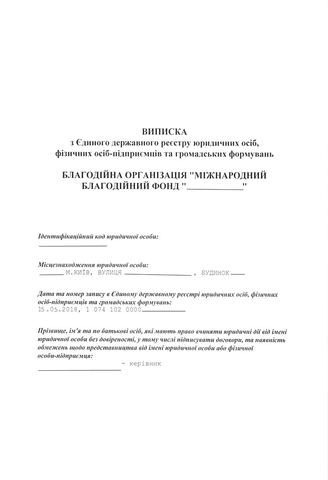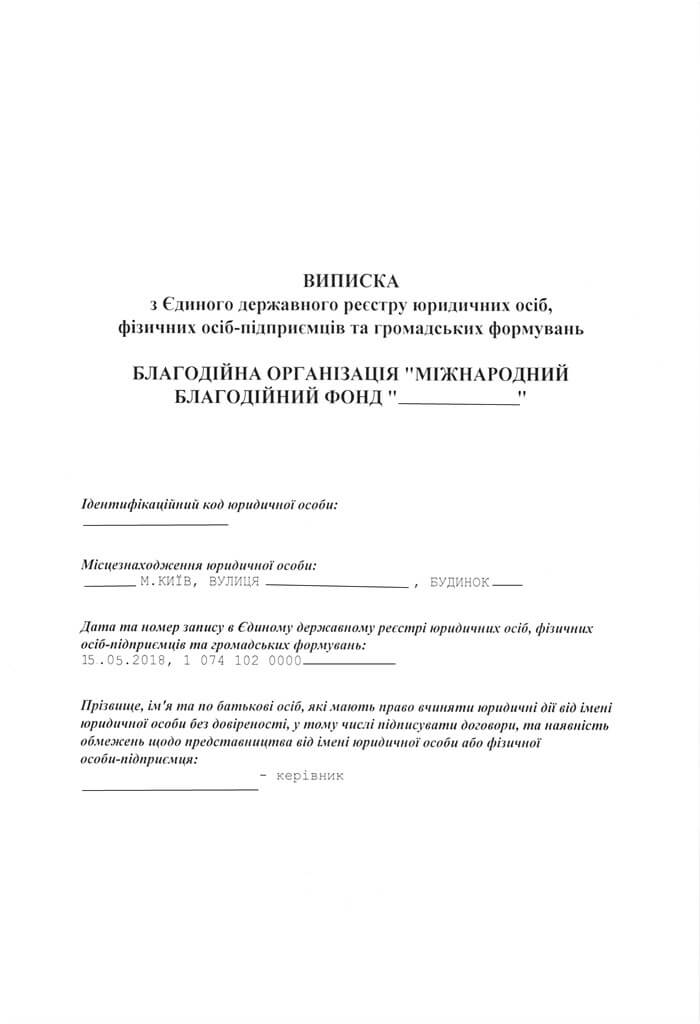Drafting the Charter of a Charitable Foundation for Importing Vehicles for the Ukrainian Armed Forces
Cost of services:
Reviews of our Clients
Recently, a client approached us who had made several unsuccessful attempts to register a charitable foundation on his own. He tried downloading registration documents from the internet and modifying them to suit his needs, then presented them at the Administrative Service Center. However, after encountering numerous setbacks, he decided to seek our assistance. The client aimed to establish a foundation through which humanitarian aid, specifically vehicles for the Ukrainian Armed Forces, could be imported. He wanted this purpose to be explicitly stated in the foundation's statute from the outset, ensuring that the importation of vehicles would be recognized as humanitarian aid. Naturally, he sought to ensure that all procedures would proceed smoothly without any unexpected issues.
Our team has initiated the development of this charter and has also commenced the process of registering the fund in the relevant registries. But we go beyond just registering charitable foundations, as any legal firm can do. We customize the charter to ensure the foundation achieves non-profit status, facilitates the importation of humanitarian aid, gets listed in the registry of volunteer organizations, and is recognized as a recipient of humanitarian aid. For more details on this case, refer to our article.
You may also like: List of Documents Required to Obtain Volunteer Organization Status in Ukraine
Drafting the Charter for a Charitable Foundation: Key Considerations
The client's goal was clear: to establish a charitable foundation focused on providing humanitarian aid, particularly by importing vehicles for the Armed Forces of Ukraine. Our journey began with a thorough analysis of gathered information during our initial consultation. With this groundwork laid, we proceeded to develop the foundation's charter, ensuring compliance with legal requirements while accommodating the client's unique vision. Our overarching objective was to safeguard the foundation against future challenges and legal pitfalls while empowering the client with the flexibility needed to achieve their philanthropic goals.
An experienced attorney knows that to achieve non-profit status, the foundation's charter must explicitly forbid the distribution of income among its key personnel, among other provisions. Additionally, the charter should include the obligation to transfer all assets to a similar organization or to the state in case of dissolution. Article 14 of the Law "On Charitable Activities and Charitable Organizations" outlines the requirements for the foundation's charter, such as its name, objectives, areas of operation, details about governing bodies and their appointment procedures, procedures for amendments, and several other pertinent points. However, there's more to consider!
At first glance, drafting the "procedure for appointing governing bodies" might seem straightforward. But as you dive into the details—outlining procedures for amendments and more—you quickly realize its complexity. Additionally, many individuals, like our client at the start of their journey, may overlook essential details while drafting their own charter. These oversights could include:
- Areas of operation: Clearly defining the scope within which the foundation will operate.
- Objectives: Establishing clearly defined goals and tasks that the foundation aims to achieve.
- Beneficiaries and forms of assistance: Specifying the individuals or groups who will receive aid and outlining the methods through which this aid will be provided.
This ensures that the charitable foundation is shielded from potential issues like accusations of misusing funds. Imagine if the foundation helped a sick girl raise funds for eye surgery, but its charter only permits assistance to children with AIDS. We've highlighted just one example of the types of challenges that could arise in the future without a thorough and responsible approach to crafting the foundation's charter.
As a result of our collaboration, our client's charter now meticulously outlines mechanisms for managing the foundation, procedures for raising and distributing funds, as well as the rights and obligations of its members. Special attention was given to provisions regarding the importation of humanitarian aid, the allocation of assistance, and more. This provides our client's foundation with the necessary legal framework to carry out its activities effectively. Subsequently, we proceeded to incorporate the charitable foundation into the relevant registries.
How to Register as a Volunteer Organization and Is It Really Necessary for All Foundations?
The term "Registry of Volunteer Organizations" is somewhat outdated; it's now known as the Registry of Organizations Engaging Volunteers in Their Activities. Inclusion in this registry is necessary for organizations intending to involve foreign volunteers and stateless individuals. However, charitable foundations that don't specifically involve foreign nationals and stateless individuals as volunteers aren't obligated to register. If a foundation decides to register, it must already hold non-profit status. The process involves submitting an application letter along with scanned copies of the charter and non-profit status certificates to the National Social Service.
As our client intended to involve foreigners, inclusion in this registry was obligatory. We assisted in gathering the required documents and submitted the application to the National Social Service. Following the submission of the letter along with scanned copies of the charter and the non-profit status certificate, our client was successfully enrolled in the registry, enabling them to recruit volunteers from abroad. However, the registration process was not yet complete at this stage.
You may also like: Inclusion in the Registry of Humanitarian Aid Recipients
Registration of Charitable Foundations in the Humanitarian Aid Recipients Registry
There's often confusion between two registries—the volunteer registry and the humanitarian aid recipients registry. Despite this, they serve distinct purposes. We previously discussed the volunteer organization registry. Now, let's focus on the registry of humanitarian aid recipients.
The Unified Registry of Humanitarian Aid Recipients is a database of legal entities that receive humanitarian assistance. Most often, these entities are charitable organizations. You can see what it looks like here. Additionally, you can see how comprehensive the information about the organization and the humanitarian aid provided is. Unlike the process of registering non-profit organizations or volunteer organizations, which usually requires submitting applications and copies of founding documents, inclusion in the registry of humanitarian aid recipients also involves providing detailed information about the aid itself.
Our lawyers equipped the client with comprehensive information about this registry and the inclusion process. We stressed and clarified that the registry requires not only copies of founding documents but also detailed information about the types and quantities of humanitarian aid received by their foundation. We assisted the client in providing the necessary information and ensured the successful inclusion of the foundation in the registry.
Following the successful registration of the charitable foundation and its inclusion in the necessary registries, our client finally gained the opportunity to commence their humanitarian activities without hindrance. They promptly initiated the importation of vehicles for the Armed Forces of Ukraine. In turn, we take pride in having assisted another client in navigating the challenging process of establishing a charitable foundation. Most importantly, we contributed to the realization of yet another project aimed at providing assistance to the Armed Forces of Ukraine during these challenging times.
If you need help developing documents for a charitable foundation and its registration, as well as inclusion in the aforementioned registries, don't hesitate to reach out. Our team boasts 15 years of experience in creating and supporting non-profit organizations in Ukraine, even handling complex cases. We offer a personalized approach to each client, considering the specifics of their activities. This allows us to propose the optimal path for registering non-profit organizations that precisely meets your needs.
You'll find all the essential services under one roof with us, eliminating the need to deal with multiple contractors. What's more, we pride ourselves on delivering truly top-notch service! Our mission is to offer you reliable and professional solutions for the successful operation of your charitable foundation.















